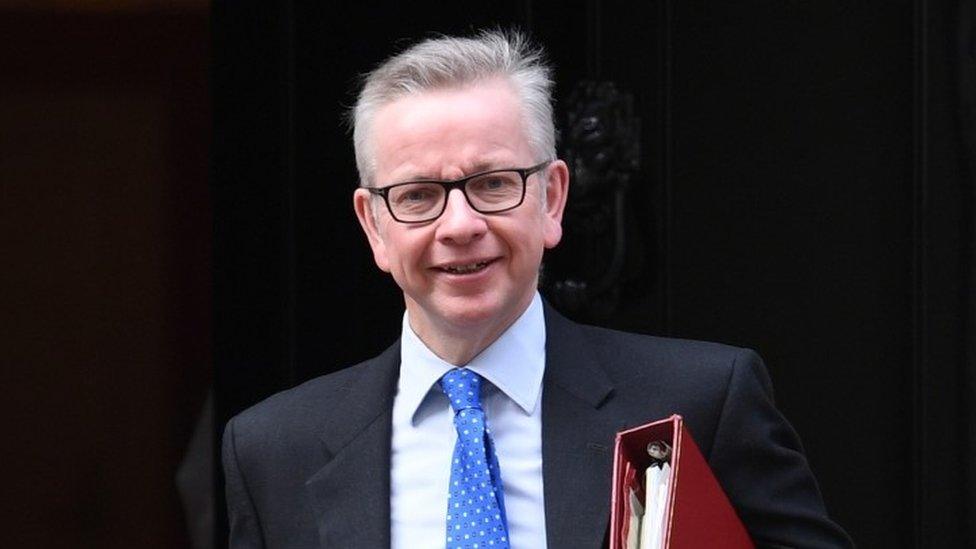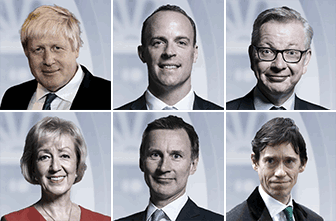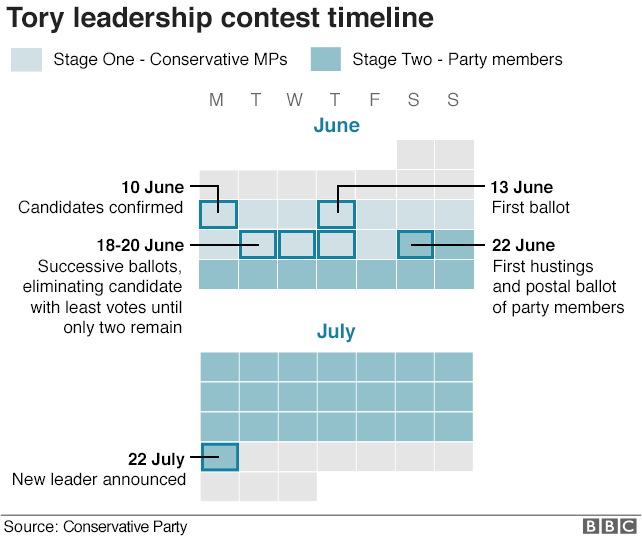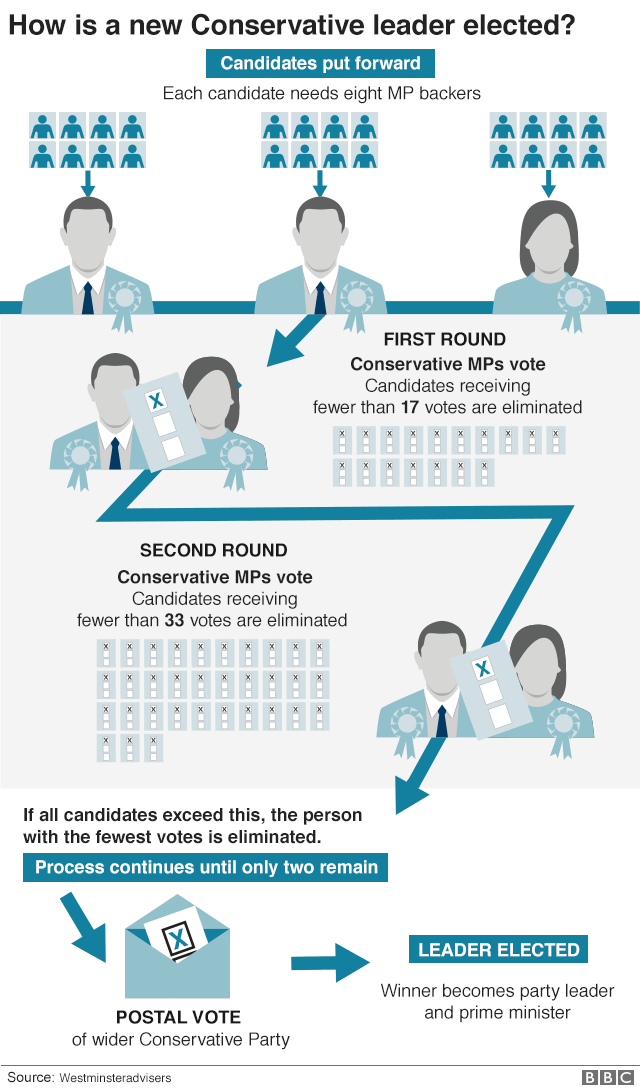Tory leadership: Brexit deadline 'not fixed date' says Gove
- Published

Conservative leadership contender Michael Gove has said he regards the UK's 31 October Brexit deadline as "arbitrary" and is "not wedded" to it.
He told an event in London the UK must not be bound by a "fixed" date if it needs slightly more time to get a deal.
But he insisted any further delay would be a matter of weeks, not months.
Other candidates, including Boris Johnson and Dominic Raab, insist the UK must leave on 31 October whether it has approved a deal with Brussels or not.
The UK was originally meant to leave on 29 March. That was then pushed back to 12 April and eventually Halloween after Theresa May failed to get MPs to approve her withdrawal agreement.
Eleven Tory candidates are seeking to succeed Mrs May as Tory leader and prime minister, with the winner of the contest to be announced at the end of July.
How the next prime minister gets a Brexit deal through Parliament and whether they would countenance a no-deal exit has been the dominant question of the campaign so far.
'Backstop movement'
On Tuesday, Mr Johnson told MPs from the One Nation group of Tories that his party risked "extinction" if it did not deliver on the 2016 leave vote.
At a Spectator event on Wednesday, Mr Gove said Brexit was a "democratic imperative" and if it "finally comes to a decision between no deal and no Brexit, I will choose no deal".
But he suggested the timing of the UK's exit was secondary to the manner of it.
"The critical thing to do is to recognise if we're not 100% out by midnight on 31 October - then we risk making that arbitrary deadline the determinant of what a good deal is," he said.
"If we're so close to the wire with what I believe is a better deal, it would be right to take those extra few days or weeks in order to land it and to make sure that we're out."


This marks the opening up of a clear dividing line in this race among those who campaigned for Brexit in 2016.
The former Foreign Secretary Boris Johnson has talked about the "potential extinction" of the Conservatives if Brexit is delayed again.
But Michael Gove is willing to entertain a delay, if he concludes a deal is achievable as the deadline approaches.
His team see this as pragmatic, but his critics will see it as him going soft.
And those supporting Mr Johnson will hope that if it comes to a run off between their man and Mr Gove, the Conservative grassroots will plump for getting out of the EU as quickly as possible.

Mr Gove said he would "be looking for movement" from the EU on the backstop - the controversial insurance policy to keep an open border on the island of Ireland that would see the UK remain aligned with EU rules and in the same customs territory.
George Eustice MP, a supporter of Mr Gove, also talked of a delay of "a few months" - a postponement that would be acceptable if a deal was close.
Allow X content?
This article contains content provided by X. We ask for your permission before anything is loaded, as they may be using cookies and other technologies. You may want to read X’s cookie policy, external and privacy policy, external before accepting. To view this content choose ‘accept and continue’.

In an article in the Daily Mail, external, Mr Gove said that pledging to leave by 31 October "come what may" would run the risk of Parliament forcing a general election, followed by a Conservative defeat at the polls.
He also promised to include Tory MPs from "across the party" in shaping the UK's Brexit stance, and to listen to DUP MPs who want Northern Irish politicians to get a formal say over the rules that would apply to Northern Ireland under the backstop.
He also wrote that he would appoint a government minister to explore options for replacing the backstop with "alternative arrangements".
The EU has said it is willing to consider alternative arrangements but the backstop must stay in the withdrawal agreement and there can be no time limit or end date.
'Not May in trousers'
Also speaking at the One Nation hustings, Foreign Secretary Jeremy Hunt said the next PM's mission must be to bring together Remain and Leave voters through a mixture of "compassionate and radical Conservative" policies.
He talked up his career as an entrepreneur before entering politics, saying he had "been doing deals all my life" and would be able to negotiate properly with other EU leaders.
"I met Macron and Merkel today in Portsmouth and a hardline approach will lead to a hardline response," he said.
He also ruled out a snap election if elected, saying he was "not Theresa May in trousers".

Who will replace Theresa May?

The winner of the contest to lead the Conservative Party will become the next prime minister.

Former Brexit Secretary Dominic Raab refused to rule out bringing the current session of Parliament to a close in the days leading up to 31 October.
Such an unprecedented move could, in theory, prevent MPs from sitting and passing legislation blocking a no-deal exit.
He said he had a "credible" plan to get a better deal for the UK, adding: "We don't just need a conviction Brexiteer, we need someone who can navigate the rocky path ahead."
"As Brexit Secretary I looked our EU opposite numbers in the eyes. I know the strengths but also the weaknesses of their positions."

But Health Secretary Matt Hancock said it was a fantasy to suggest only someone who backed Brexit in the referendum could negotiate the right Brexit deal.
He said the party "needed a leader for the next six years" and someone who could move the conversation on from Brexit if the party was to win the next election.
But Mr Hancock has been accused of a "baseless political attack" after he claimed that if Labour won power, the UK would be electing "the first anti-Semitic leader of a Western nation since the Second World War".
Labour said the comments "rings hollow from a minister in a party that has supported governments that actively promote anti-Semitic policies in Hungary and Poland, and has spent the week wooing Trump".
Shadow chancellor John McDonnell called them "a disgrace".
